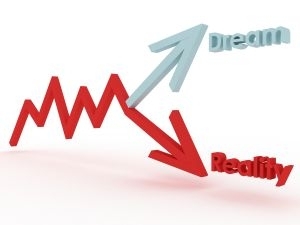| Home | About | Archives | RSS Feed |

@theMarket: Jobs Versus the Market
 The May non-farm payroll jobs report was a disappointment. So much so that investors dumped stocks, convinced that because the country only added 54,000 jobs, the economy is kaput and we all headed for economic Armageddon. Now, doesn't that sound silly?
The May non-farm payroll jobs report was a disappointment. So much so that investors dumped stocks, convinced that because the country only added 54,000 jobs, the economy is kaput and we all headed for economic Armageddon. Now, doesn't that sound silly?
Let's get real folks. We didn't lose 300,000 jobs last month, which might have justified Friday morning's sell-off. Sure, economists were looking for a job gain of 100,000 plus but why should any one be surprised that unemployment is still above 9 percent given the slow growth rate of our economy?
Since the end of the recession, quarterly GDP has been at best erratic. Beginning with the third quarter of 2009, we have experienced the following string of quarterly numbers: 1.6, 5.0, 3.7, 1.7, 2.6, 3.1, 1.8 percent. All but one of those quarters have trended well below the normal economic recovery rates associated with the end of a recession. Is it any wonder that our unemployment rate bounces around while remaining inordinately high?
The spate of negative economic numbers we have been experiencing of late, in my opinion, has much more to do with the body blow Japan has taken from its earthquake and aftermath. After all, Japan is the second largest economy in the world and the fallout from its present recession impacts everyone.
As for the markets, I believe there are similarities between the April-August period of last year and what is happening today. At that time investors were concerned that we were falling back into a double dip recession. GDP for the second quarter of 2010 had dropped to 1.7 percent from 3.7 percent, while unemployment hovered at 10 percent.
The S&P 500 Index fell by over 16 percent. It was only after the Federal Reserve Bank announced the possibility of QE II that the markets recovered in August. Now the S&P is almost 300 points higher.
Last quarter's GDP growth rate was 1.8 percent down from 3.1 percent the quarter before and unemployment is 9.1 percent, up a smidgeon from last month. Unlike last year, however, we face the "end" of QE II in less than 30 days.
Readers may recall that I discounted a double-dip recession last year. I argued that we were in a slow growth recovery and should expect erratic and conflicting economic data into the foreseeable future. As long as the housing market remains in the doldrums, so will the economy. That argument still holds. At the same time, if the economy slows further, the Fed still has our back no matter how many QEs it takes.
What investors tend to forget is that we narrowly escaped a second worldwide Depression two years ago. While politicians, investors and taxpayers alike speechify about our government's huge deficit and wasteful spending, they should stop and ask why the deficit and spending is where it is today.
As a result of the financial crisis, the deleveraging of debt in the private sector was an absolute necessity. The only way to accomplish that, without driving the world over the brink, was for the government to take on that debt (deliberately leveraging the public sector balance sheet) while, at the same time, spending as much as possible to jump start the economy.
To date, that strategy has worked, although not as perfectly as certain textbook economists might have hoped. We have averted a Depression although this last Great Recession is not like any of the recessions we have experienced since the end of WW II. It is going to take time, effort and patience to unwind the financial tangle that our banks, brokers and insurance companies have created. We are on the right track, even if our path ahead is dimly lit. Expect the track to run through peaks and valleys, make sharp turns, and accelerate at times, while coasting at others. In the meantime, stay the course.
As I write this, the markets are wrestling with 1,300 on the S&P 500 Index, the bottom end of my projected range. Could the markets fall even further? Of course, they can. If we break 1,300, the next stop would be 1,250-1,275, still not the end of the world. From top to bottom that would be an 8 percent correction, after a 300-point rally over 11 months. I'll gladly accept that kind of pullback for a chance to rally up to 1,400 or above.
Bill Schmick is an independent investor with Berkshire Money Management. (See "About" for more information.) None of the information presented in any of these articles is intended to be and should not be construed as an endorsement of BMM or a solicitation to become a client of BMM. The reader should not assume that any strategies, or specific investments discussed are employed, bought, sold or held by BMM. Direct your inquiries to Bill at (toll free) or e-mail him at wschmick@fairpoint.net. Visit www.afewdollarsmore.com for more of Bill's insights.
| Tags: jobs, unemployment, economy |

